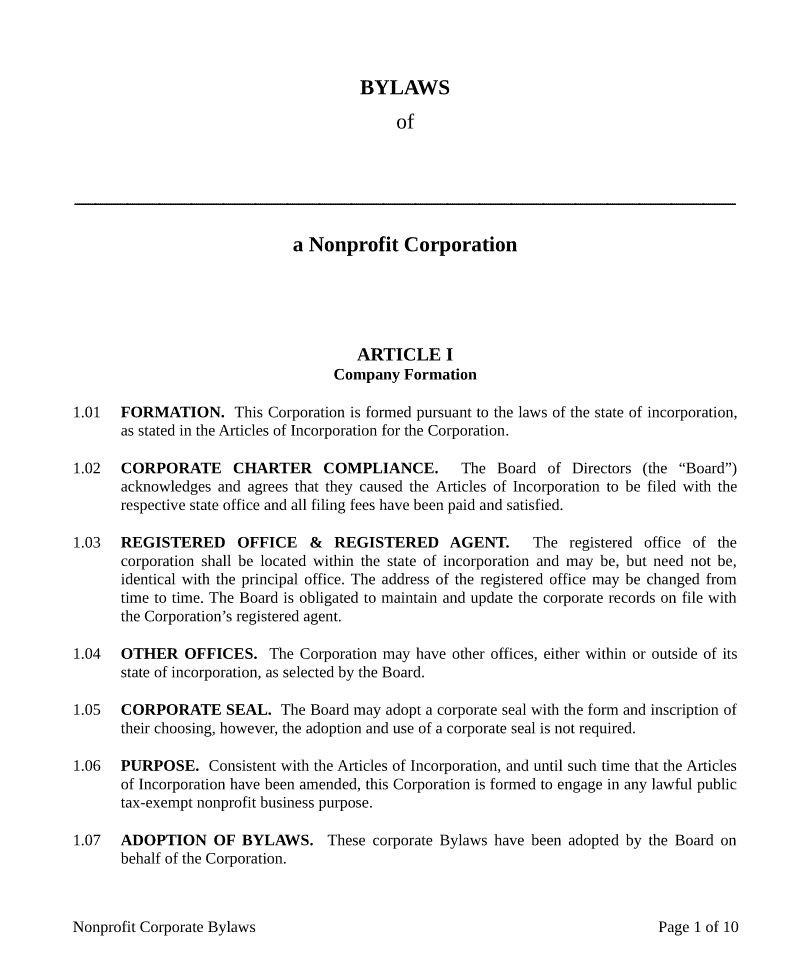West Virginia Nonprofit Bylaws
West Virginia nonprofit bylaws work as a how-to manual for running your nonprofit. Your bylaws will include rules for how your board of directors, officers, and othersshould address a variety of situations, from holding meetings to handling conflicts of interest. Your bylaws should be detailed and clear so that everyone in your nonprofit is on the same page about protocols.
Not sure where to begin? Download our free attorney-drafted nonprofit bylaws template to get started.
Why does a West Virginia nonprofit need bylaws?
Your West Virginia nonprofit bylaws work as a guidebook for your board of directors. You’ll include protocols for all sorts of eventualities, and you’ll be able to refer to your bylaws during times of emergency or upheaval.
But that’s not the only reason that you need nonprofit bylaws in West Virginia.
1. Nonprofit bylaws are legally required in West Virginia.
First and foremost, your bylaws are a mandatory part of incorporating in West Virginia. According to WV §31E-2-205, the incorporators or board of directors “shall adopt initial bylaws for the corporation.” In order to stay in compliance with the West Virginia Nonprofit Corporation Act, your nonprofit must have bylaws.
2. Third parties will ask to see your bylaws.
Third parties will ask to see your bylaws, and having them already drafted and ready to go will make things easier down the road for you.
For example, a bank might ask to see your bylaws as proof that you are authorized to open a business account for the nonprofit. Or, if your nonprofit chooses to apply for 501(c)(3) tax-exempt status, the IRS will require that you include your bylaws with the application.
3. Nonprofit bylaws allow you more control over your nonprofit.
Since your bylaws list out protocols that your nonprofit and those acting on the nonprofit’s behalf should follow, thorough bylaws can help prevent disputes. However, if your bylaws are incomplete or unclear, a dispute could be taken to court. As a result, a judge would then make the final decision to resolve the issue. By having clear bylaws from the beginning, you can better avoid these headaches and maintain control over your nonprofit.
Want to learn more? Check out our Guide to Nonprofits.
What do West Virginia Nonprofit Bylaws include?
Your West Virginia nonprofit bylaws “may contain any provision for managing the business and regulating the affairs of the corporation that is not inconsistent with law or the articles of incorporation”, according to WV §31E-2-205. You can include the legal requirements from the state and your West Virginia Nonprofit Articles of Incorporation inside the bylaws, keeping all protocols in one document.
You can include the following in your bylaws:
- Managing board members
- Holding board meetings
- Voting and meeting quorum requirements
- Keeping financial records
- Handling conflicts of interest
- Amending the bylaws
- Merging the nonprofit
- Dissolving the nonprofit
And anything else that your board of directors thinks will be a crucial or reoccurring situation.
Are nonprofit bylaws legally binding?
Absolutely. Alongside the state’s legal statutes and your Articles of Incorporation, your bylaws are legally binding protocols that your nonprofit and those acting on the nonprofit’s behalf must follow. There could be legal repercussions if your bylaws are ignored or forgotten.
Are nonprofit bylaws public record?
Not necessarily. Your bylaws are technically an internal document. However, because of the process for applying for 501(c)(3) tax-exempt status, your bylaws could become public. When applying to become tax-exempt with the IRS, you will have to attach your bylaws to your application, and the IRS makes all of this publicly available.
FAQs
No. Your bylaws are legally binding as soon as they are adopted. However, we do recommend getting your board of directors to sign your bylaws at the first organizational meeting. It makes things clearer, both in the face of a dispute and for your records, that your whole board is aware of the bylaws from day one.
Yes! In fact, you’ll likely need to change your bylaws. The process for amending your bylaws should be in your first initial draft of your bylaws. You will want to go through your bylaws from time to time to add or adjust any necessary provisions.
Your incorporators or your board of directors must adopt your bylaws in order to be in compliance with West Virginia incorporation statutes. Bylaws are typically adopted at the nonprofit’s organizational meeting.
